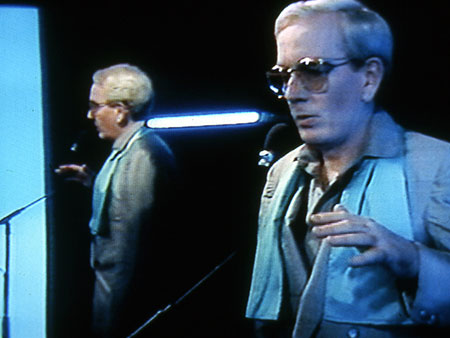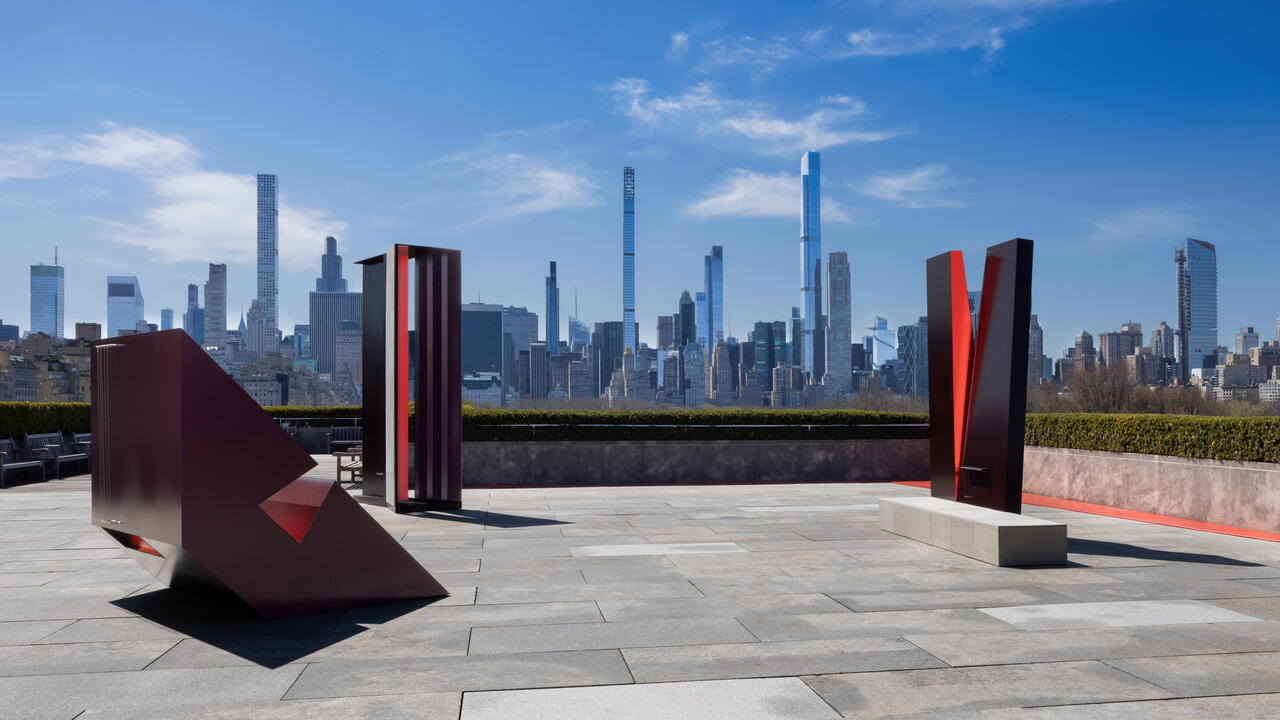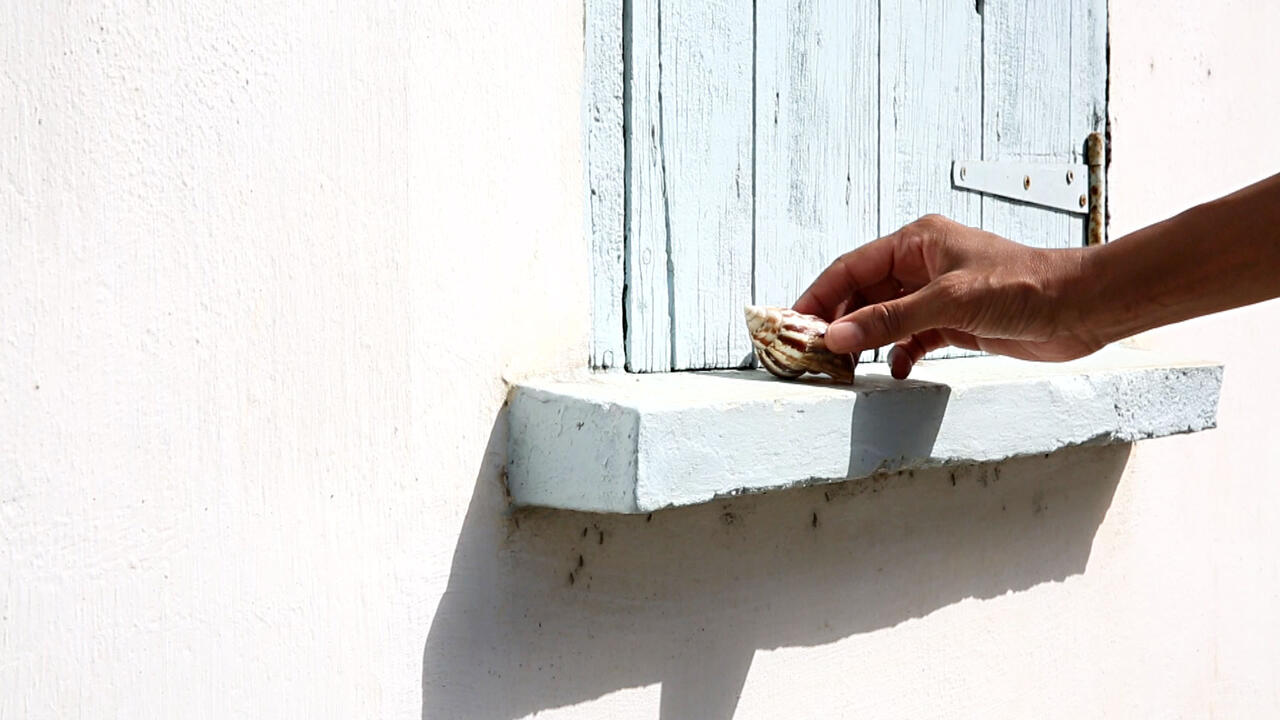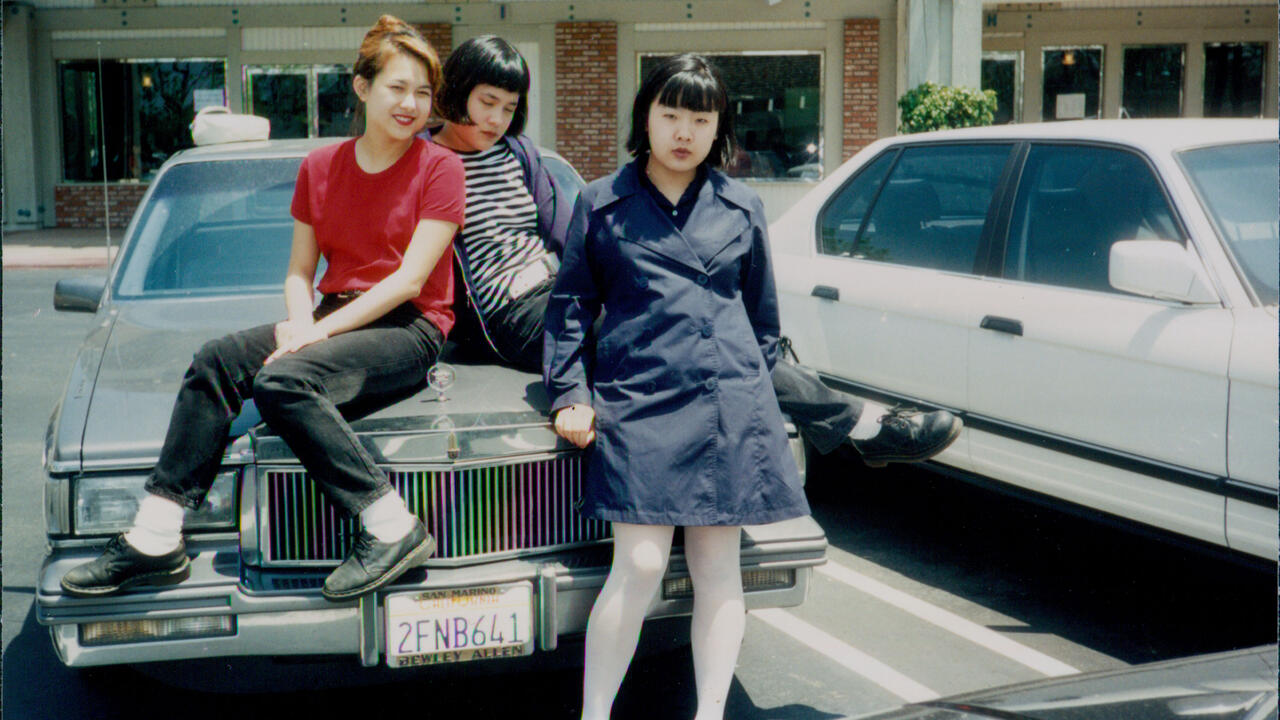American Opera
First broadcast in 1983, Robert Ashley’s TV opera Perfect Lives is a talkative exploration of sociability and storytelling
First broadcast in 1983, Robert Ashley’s TV opera Perfect Lives is a talkative exploration of sociability and storytelling

‘These are songs about the Corn Belt, and some of the people in it … or on it.’1 That’s what the man in the Perfect Lives Lounge says as you sit down with your drink, served in ‘a fluted plastic glass, sans ice’. Maybe he says it in Spanish, but you’re not sure. After all, even if you don’t speak a language, you can catch its drift if it’s sung.
The Perfect Lives Lounge – let’s just call it The Bar – is sparse, but elegantly decorated. Colour scheme: hints of neon against inky black infinitude, here and there a blush of pink and baby blue. Seven vertical neon strips form The Bar’s sign. As your eyes adjust to the light, everything looks soft-edged, like a 1980s video or television broadcast, occasionally flecked with static. Come to think of it, from a certain angle, The Bar looks like a television studio set. Exact dimensions are uncertain; windows between interior and exterior dissolve rhythmically into one another. The man – Corn Belt Guy – is standing in the middle of the room. He has a full head of fine white hair, dusted with glitter, which is neatly parted down one side. His lips shine with gloss. He wears big tan-tinted glasses. Round his neck hangs a dapper navy blue scarf, smoothed neatly onto the lapels of his grey silk suit. Occasionally he swaps the scarf for an orange or pink number. A red light-bulb hanging from the ceiling hovers right next to his face. He looks debonair, although perhaps sleazy from some angles. The music in the bar has a Latin swing – simple drum-machine rhythms with soft jazzy chords from a piano drifting over the top. You order another round from Rodney, the Bartender, who looks a lot like Corn Belt Guy. ‘He says, right off, we don’t serve fine wine in half-pints, buddy.’

In The Bar, Corn Belt – we must stop calling him that now – is better known as Raoul de Noget, or ‘R’. ‘R’ is a singer and he’s here with his friend Buddy, ‘The World’s Greatest Piano Player’. They’re supposed to be taking the day off from making music, but that was Buddy you heard teasing out those soft, jazzy chords earlier. Check out his look: black fedora, shades, royal blue shirt with blousy sleeves garlanded in rhinestones. There’s a ring with a big ruby rock on his little finger and constellations of sequins stuck on his hands – and it’s mostly his hands we’re interested in looking at. Now he’s ripping up that keyboard with explosive boogie-woogie improvisations, playing like he’s … ‘The World’s Greatest Piano Player’. Rodney reminds us: ‘We don’t serve fine wine in half-pints, buddy / Is the sound of God.’
Outside The Bar, beyond the unnamed Midwest town in which it sits, ‘R’ is better known as the composer Robert Ashley. Ashley – now aged 81, and one of the most important living exponents of opera in America, or, more precisely, the most important living exponent of American opera – created Raoul, Buddy, Rodney and The Bar for Perfect Lives, an opera originally conceived and developed for TV between 1978–83. Produced by Ashley, Carlota Schoolman and The Kitchen in New York, Perfect Lives evolved through a number of live iterations before being broadcast in the UK by Channel Four in 1983, back in the day when the broadcaster’s schedules supported radical art and minority-interest audiences.
Perfect Lives is an opera about … Jeez, where shall I begin? Well, not at the beginning, because Perfect Lives is about digressions. As Ashley says, ‘No story has a beginning, it’s all digression […] It’s digression what everybody does, every time. The trick of performing that piece is that we literally never know what we’re going to do until we hear the first note.’2 Like talking, it’s about being in the moment; we don’t know what we’re going to say until we say it. ‘Composing music’, Ashley holds, ‘is the process of constantly making a decision about when you’re going to update what you’ve just done.’3Perfect Lives consists of digressions about the US landscape and American lives, performed in American vernacular language. ‘I’m trying hard, in Perfect Lives, to reproduce the music of the way people talk. It’s not poetry, it’s song. It’s song in the same way that, I suppose, The Iliad was a song. It’s just a song. If you read any one line, it’s not that interesting in itself, but if you read a hundred they start to make sense.’4 John Cage once said of it: ‘What about the Bible? And the Koran? It doesn’t matter. We have Perfect Lives.’

But I’m getting ahead of myself. Digressing. ‘If I were from the big town, I would be calm and debonair. The big town doesn’t send its riff-raff out.’ The drink must be going to my head, buddy. To get back to the point, it’s been said that Ashley is a great American writer disguised as a composer. (‘A little knowledge dot dot dot.’) You could also say that Perfect Lives – with its future-retro animated title sequences, complex fusions of internal and external locations, wild video effects and outlandish costuming – is a great work of experimental television drama disguised as performance art disguised as video art disguised as an opera. It was originally conceived of as the second work in a trilogy, bookended by Atalanta (Acts of God) (1982–91) and Now Eleanor’s Idea (1993), each work using progressively smaller and more fragmented units of narrative, and each concerning itself with different stages of the American story – from its links to the old world in Atalanta (Acts of God), passing through the Midwest for Perfect Lives to life at its most western edge in Now Eleanor’s Idea. The works use aspects of language that have long interested Ashley: dialect patterns, chanting, ultrafast speech, ecstatic religious preaching, Renaissance philosophy, involuntary speech (also explored in his 1979 work Automatic Writing), understanding the world verbally as opposed to physically, or even metaphysically (an idea he first touched upon in his 1967 opera That Morning Thing). Some parts of the trilogy share the same characters. Like a human heartbeat, they all have a pulse of 72 beats per minute.
A thumbnail sketch of the narrative that Ashley – or, if you prefer, ‘R’ – tells in Perfect Lives looks something like this. The story is divided into seven episodes, each set in a different location in a Midwest town: ‘The Park (Privacy Rules)’; ‘The Supermarket (Famous People)’; ‘The Bank (Victimless Crime)’; ‘The Bar (Differences)’; ‘The Living Room (The Solutions)’; ‘The Church (After the Fact)’; and ‘The Backyard (T’Be Continued)’. Raoul and Buddy are itinerant musicians playing a residency at the Perfect Lives Lounge. They befriend Isolde and ‘D’ (‘The Captain of the Football Team’) and together hatch a plot ‘to remove a sizeable amount of money from The Bank for one day (and one day only) and let the whole world know that it was missing’. If they get caught, it’s a crime, but it’s Art with a capital ‘A’ if they get away with it. ‘D’ works at The Bank, where one of the clerks, Gwyn, is planning to elope with his friend Ed. A plan is made to use the lovers’ car to take the money across the border to Indiana and then return it the next day. That, at the very least, is the kernel of the dizzying story. As the opera unfolds, we also meet characters such as Rodney The Bartender, Lucille, Snowdrift, Will and Ida – The Sheriff and his wife, also ‘D’ and Isolde’s parents – Helen and John (innocent bystanders from a local old people’s home), Dwayne (who has problems making his speech understood), and the bank clerks Jennifer, Kate, Linda, Susie and Eleanor (who falls in love with Buddy, and whose later religious experiences are explored in Now Eleanor’s Idea).
As living and breathing musicology in practice, Perfect Lives explores how storytelling creates music and – tangentially – how American social models grew in tandem with musical forms from Europe and Africa. Built into the very structures of how it was written and is performed – there is no definitive score, only the libretto, some diacritic and harmonic indications, and a set of intricate time signatures to follow – Perfect Lives is about the sociability of music. Ashley realized Perfect Lives over a period of years with a number of close collaborators. (‘I only work with geniuses,’ he says. ‘In the end it pays off.’5) In a documentary made by Peter Greenaway in 1983, as part of his ‘Four American Composers’ series, Ashley said he wanted to ‘allow the performers to make musical statements as unpremeditated as speech itself’. Rehearsal allows performance to become habitual, in the way that speech is habitual, but Perfect Lives’s realization is largely in the moment. It’s about the musical commons that being in a band grants access to. Buddy’s virtuosic piano playing – which, over the course of the opera, wraps cocktail jazz inside pop inside boogie-woogie inside classical – was by ‘Blue’ Gene Tyranny, who developed the harmonic structures used in the opera. Composer Peter Gordon was the music’s producer and in charge of electronics and mixing, while musicians Jill Kroesen and David Van Tieghem evolved the singing parts for the various characters that make up the chorus – Isolde, ‘D’, Gwyn, Ed and so on. Musically, the result is unique, of no school of postwar US music other than its own: steady, loping drum patterns, washes of synthesized strings, Buddy’s almost stream-of-consciousness piano – all somehow harmonically smooth and easy on the ear yet packed with complexity and detail. And throughout it all, there is Ashley’s voice: a sing-song patter with the soft-spoken intimacy of a late-night radio DJ.

Perfect Lives found its visual form through John Sanborn, who directed the opera for television. Dean Winkler was responsible for staging, video editing, animations and graphics, while Jacqueline Humbert designed the opera’s audacious lounge lizard and ’80s high-fashion-meets-sci-fi costuming and make-up. Templates for the camera movements in the opera were mapped out by Sanborn, who divided the screen into a series of vertical and horizontal bands: ‘The Park’ is represented by the low, tracking shot of a horizon, for instance, and ‘The Supermarket’ uses the baseline of ‘The Park’s horizon from which it shoots two converging lines to form a triangular pattern – like an aggressive zoom shot. ‘The Bank’ is a grid and ‘The Bar’ just the vertical lines from the grid. These are subtly echoed by ‘R’s hand-gestures – sometimes side-to-side, other times up-and-down – or Buddy’s hands dancing across the keyboard. Perfect Lives is opera for the screen age, not the crumbling theatres of 19th-century operatic form.
Identities in Perfect Lives are fluid representations. Robert is Raoul, Rodney and The Justice of the Peace. Jill plays Isolde and Ida and Gwyn. (‘When I work in someone else’s work it’s more helpful to me to know what they want me to do, and I think I realized what he [Ashley] wanted me to do was to find out what I’m supposed to do myself,’ says Van Tiegham – or ‘D’, Will, Ed – in Greenaway’s film.) That’s an easy enough idea to understand, but then you get carried away listening to Buddy, take your eyes off ‘R’ to look down at your drink – sans ice – glance up again and ‘R’ is no longer Robert. Ned Sublette is now ‘R’ and ‘R’ is Cuban – grew up north of the US/Mexico border. Elio Villafranca has swapped places with ‘Blue’ Gene to become Buddy; also Cuban but grew up south of the border. The Bar has been rechristened La Vidas Perfectas Lounge.
‘Whoa, Lucille!’ How’d that happen? Well, the end of 2011 saw a number of revivals of Ashley’s work. That Morning Thing was restaged at The Kitchen in a production directed by Fast Forward, curated as part of Performa 11 by Mark Beasley. Varispeed produced Perfect Lives Manhattan and Perfect Lives Brooklyn; new arrangements of the piece performed in site-specific locations around New York City. Vidas Perfectas – with ‘R’ and Buddy now in residency in La Vidas Perfectas Lounge – is an ambitious new Spanish-language version of Perfect Lives, directed by Alex Waterman (who, with Will Holder, is currently working on a study of Ashley’s practice, due to be published at the end of this year) from a translation by Javier Sainz de Robles. Produced under the auspices of ISSUE Project Room and Ballroom Marfa, Vidas Perfectas is, like the original Perfect Lives, designed for television, and will grow steadily in phases over the course of the next two years. Three episodes were staged in December 2011 at the Irondale Theater in Brooklyn – ‘El Parque’ (The Park), ‘La Iglesia’ (The Church) and ‘El Patio de Atrás’ (The Backyard) – with further episodes to be produced in Marfa, Texas, this summer, and a pilot version planned for the end of the year. It is a slow, carefully evolving project, because: ‘we don’t serve fine wine in half-pints, buddy.’

Vidas Perfectas relocates the action to west Texas, on the US/Mexico border. For Ashley, opera is characters in a landscape telling stories musically, and he’s been telling stories in Spanish since 1979. Spanish is the second language of the US, first arriving in the 16th century, and today spoken by some 35 million people. Jean-Luc Godard observed in Notre Musique (Our Music, 2004) that America is a country that has no name – there’s a US, which is in the Americas, but there are many other Americas too, and the US story has been one of looking for self-hood, along the way erasing other cultures that share the same territory. Vidas Perfectas is about the literal and psychological borders between the different Americas, so stories about the US are probably just as well told in Spanish as they are in English.
If, musically speaking – and Ashley’s work is nothing if not about musically speaking – Perfect Lives refracts US lives through jazz, boogie-woogie and pop, then Vidas Perfectas looks at the Cuban and Cajun strains that run through the culture: rock’n’roll, Caribbean music, mambo, salsa. Villafranca, the award-winning Cuban jazz pianist, takes on the role of Buddy, resplendent in a spangled customized mariachi jacket. Sublette – a Spanish-speaking gringo from west Texas whose musical experiences span ’80s downtown avant-garde rock, Afro-Caribbean music, and country and western, and who is a noted scholar of Cuban music and the musical cultures of New Orleans – cuts an imposing figure as ‘R’; Ashley’s silk scarves and shiny suits replaced with a black stetson, laredo tie and cowboy boots. Abraham Gomez-Delgado (a composer of Peruvian and Puerto Rican descent) and Elisa Santiago (a dancer, designer and performer whose Spanish is classical Castellano) play the chorus roles. Waterman has built Vidas Perfectas along the same lines as Ashley’s productions of Perfect Lives: with Gordon back on board as producer, and artist Sarah Crowner designing the sets, Vidas Perfectas ‘uses the social relations that were involved in making the music as the model for its remaking’6, embracing conversation, improvisation and process to tint and colour the production in new ways. ‘Experimental music’, Waterman suggests, ‘is about doing what you don’t know how to do.’7Vidas Perfectas is not a slavish replication of Perfect Lives. The sets and costuming evoke the south; Sublette’s black-clad southern gent look, for instance, or the elegant way in which Crowner’s sets seem to evoke both early Modernist abstraction and Mexican traditional design. Waterman and his collaborators delicately transform Ashley’s music; it remains unmistakably Ashley, but Latin influences are teased out and foregrounded, by both Villafranca’s piano and by new shifts of rhythmic emphasis in the pre-recorded drum patterns. The performances in Spanish put Ashley’s libretto into motion in new ways: Sublette’s rich voice plays down the beguiling casualness of Ashley’s intimate patter, infusing the role of ‘R’ with a more brooding intensity. Even if you do not speak Spanish, surrendering yourself to the musicality of the overall sound still, somehow, allows access to the mystery of Perfect Lives’s libretto.
John Cage once said: ‘Qué pasa con la Biblia? Y el Corán? No importa. Tenemos Vidas Perfectas.’ In the world of Perfect Lives – Manhattan, the Midwest or Texas – people ‘come to talk. They pass the time. They soothe their thoughts with lemonade. They say things like: She never had a stitch that she could call her own, poor thing. And, Carl’s still president over at the bank, ain’t he? […] They are the planets in this scheme of things.’
1 All quotes, unless otherwise indicated, are taken from the libretto to Perfect Lives, published in Robert Ashley, Perfect Lives, Dalkey Archive Press, Champaign/Dublin/London, 2011
2 ‘Robert Ashley Talks about Perfect Lives’, Ibid., p.173
3 Ibid., p.149
4 Ibid., p.168
5 Promotional video for Vidas Perfectas, http://tinyurl.com/8x2py5b
6 Alex Waterman, ‘Robert Ashley’, Bomb, issue 118, Winter 2012
7 Alex Waterman in conversation with the author, New York, January 2012






















